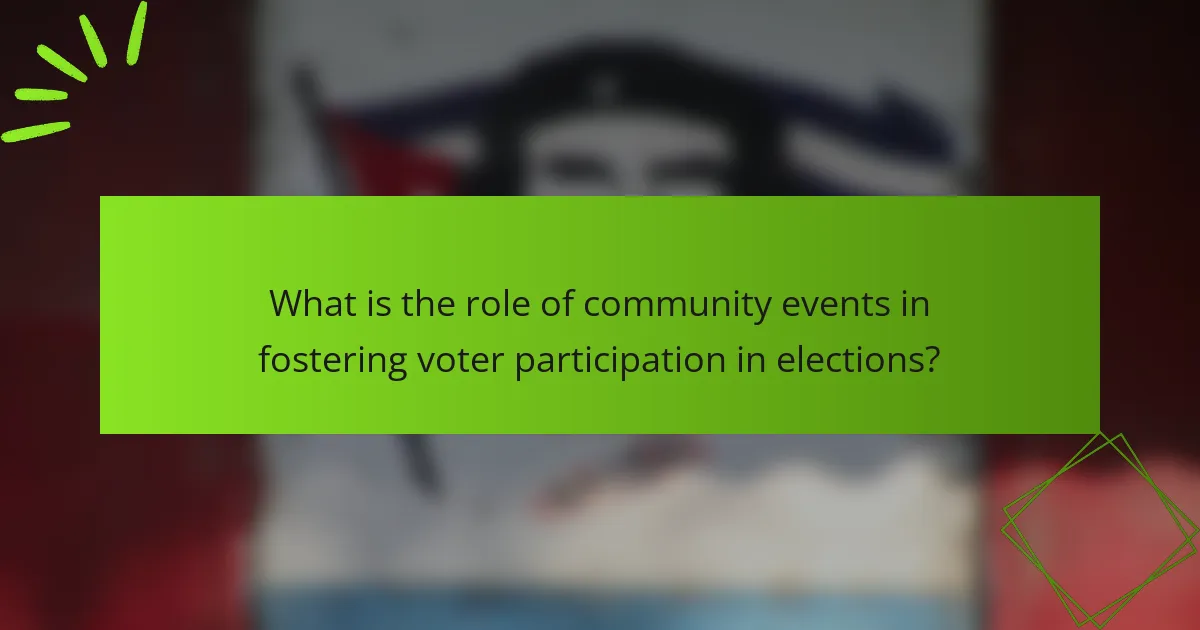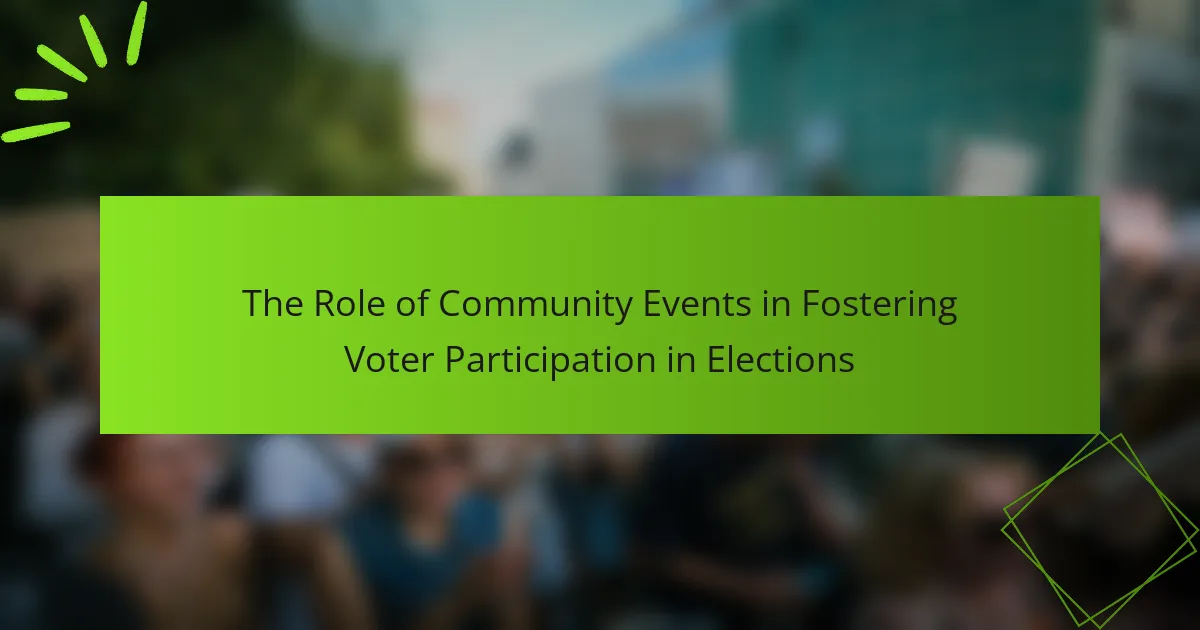Community events are organized activities aimed at increasing voter participation in elections. These events, which include voter registration drives, town hall meetings, and informational sessions, provide citizens with opportunities for engagement and education about the voting process. Research shows that communities that actively participate in these events can experience voter turnout increases of up to 20%, as reported by the U.S. Census Bureau. By facilitating connections between candidates and constituents, community events play a vital role in mobilizing voters and enhancing democratic participation.

What is the role of community events in fostering voter participation in elections?
Community events play a crucial role in fostering voter participation in elections. They create opportunities for engagement and education among citizens. These events often include voter registration drives, town hall meetings, and informational sessions. Such gatherings help demystify the voting process. They also provide a platform for candidates to connect with constituents. Research indicates that communities with active event participation see higher voter turnout. For instance, the U.S. Census Bureau reported that local engagement efforts can increase participation by up to 20%. This highlights the effectiveness of community events in mobilizing voters.
How do community events influence voter turnout?
Community events significantly influence voter turnout by fostering engagement and awareness. These events create opportunities for individuals to discuss political issues in a social setting. They often feature candidates and provide platforms for dialogue. Research indicates that communities with active event calendars see higher voter participation rates. For instance, a study by the National Civic League found that neighborhoods hosting regular events increased turnout by 10-15%. Additionally, these gatherings can mobilize volunteers who encourage others to vote. Overall, community events serve as vital catalysts for increasing electoral participation.
What types of community events are most effective in promoting voter participation?
Voter registration drives are highly effective community events for promoting voter participation. These events provide direct assistance to individuals in registering to vote. They often include educational components about the voting process. Community forums also play a significant role by facilitating discussions on local issues. These forums encourage civic engagement and inform citizens about their voting power. Additionally, social gatherings that incorporate voter education can motivate attendees to participate in elections. Studies indicate that when communities actively engage in these events, voter turnout increases significantly. For instance, a report by the U.S. Census Bureau shows that areas with regular voter outreach events have higher registration rates.
How do community events create a sense of civic engagement?
Community events foster civic engagement by providing opportunities for individuals to connect with their neighbors. These gatherings encourage dialogue about local issues and promote collaboration among residents. Participation in events can lead to increased awareness of civic responsibilities. Engaged citizens are more likely to vote in elections. Research shows that communities with active event calendars see higher voter turnout. For instance, a study by the National Civic League indicated that civic engagement activities boost electoral participation by 20%. Overall, community events serve as a catalyst for building a more engaged and informed citizenry.
Why are community events important for voter education?
Community events are important for voter education because they provide accessible platforms for information dissemination. These events facilitate direct interaction between voters and experts. They often feature workshops, discussions, and Q&A sessions. Such formats allow participants to clarify doubts regarding the voting process. Community events also foster a sense of civic engagement. They encourage individuals to understand their rights and responsibilities as voters. Statistics show that informed voters are more likely to participate in elections. According to the U.S. Census Bureau, voter turnout increases significantly when education is prioritized.
What information do community events provide to potential voters?
Community events provide potential voters with information about candidates, policies, and voting procedures. These events often feature speeches from candidates and discussions on key issues. Attendees can ask questions directly to candidates. Community events also distribute literature that outlines candidate platforms and local ballot measures. They serve as a platform for civic engagement and education. Additionally, these events often include information on registration and polling locations. Statistics show that community engagement increases voter turnout by fostering informed decision-making. Engaging with local leaders at these events builds trust and community involvement in the electoral process.
How do community events address common misconceptions about voting?
Community events address common misconceptions about voting by providing direct education and engagement opportunities. These events often feature workshops and discussions led by knowledgeable speakers. They clarify what is required to register and vote, dispelling myths about eligibility. For instance, many people believe they cannot vote if they have a criminal record. Community events can inform participants that laws vary by state, allowing some individuals to vote after serving their time. Additionally, events often provide resources such as pamphlets and access to voter registration services. This hands-on approach helps attendees understand the voting process better. Surveys indicate that participants in these events feel more confident about their voting knowledge. Therefore, community events play a crucial role in correcting misinformation and encouraging informed voter participation.
In what ways do community events build connections among voters?
Community events build connections among voters by facilitating direct interaction and engagement. These gatherings provide a platform for voters to meet candidates and discuss issues. They also foster a sense of belonging and community identity among attendees. Research shows that personal interactions at events increase voter motivation and turnout. Events often include activities that promote civic education and awareness. This education helps voters understand the electoral process and the importance of their participation. Additionally, community events can create networks of support among like-minded individuals. Such connections can lead to increased advocacy and mobilization efforts within the community.
How do social interactions at community events encourage voting?
Social interactions at community events encourage voting by fostering a sense of belonging and civic engagement. These events create opportunities for individuals to discuss political issues and share information about the voting process. When people engage with their peers, they are more likely to feel motivated to participate in elections. Research shows that social networks significantly influence voting behavior. For example, a study by the Pew Research Center found that individuals who discuss politics with friends are more likely to vote. Additionally, community events often provide resources such as voter registration assistance, making the process more accessible. Engaging with others at these events can reinforce the importance of voting and lead to higher turnout rates.
What role do local organizations play in facilitating community events for voter engagement?
Local organizations play a crucial role in facilitating community events for voter engagement. They organize events to educate citizens about the voting process. These organizations often collaborate with local governments and advocacy groups. They provide resources such as voter registration information and polling location details. Events may include town halls, workshops, and informational fairs. Research shows that community events increase voter turnout by fostering a sense of civic duty. A study by the National Civic League found that communities with active local organizations saw a 20% higher voter participation rate. Local organizations also help create a welcoming environment for discussions about civic issues. Their efforts ensure that diverse voices are heard in the electoral process.
How do community events change perceptions about the electoral process?
Community events positively influence perceptions about the electoral process. They create an engaging environment for discussions about voting. These events often provide information on candidates and issues. Attendees can ask questions and express concerns in a welcoming space. Research shows that community involvement increases civic engagement. For example, a study by the National Civic League found that community forums enhance understanding of electoral processes. This heightened awareness can lead to increased voter turnout. Ultimately, community events demystify elections and encourage active participation.
What impact do community events have on voter confidence?
Community events positively impact voter confidence. They provide a platform for engagement between voters and candidates. Such events foster a sense of community and belonging. Increased interaction leads to better-informed voters. Research indicates that communities with active events see higher voter turnout. A study by the Pew Research Center found that 61% of participants felt more confident in their voting decisions after attending local events. These gatherings also help dispel misinformation. Overall, community events enhance trust in the electoral process.
How can community events help marginalized groups feel included in the electoral process?
Community events can help marginalized groups feel included in the electoral process by providing a platform for engagement. These events create opportunities for education on voting rights and processes. They also foster relationships between community members and local leaders. This connection can empower individuals to participate in elections. Additionally, community events can address specific barriers faced by marginalized groups. For example, they can offer resources such as transportation assistance and language support. Research shows that inclusive events increase voter turnout among underrepresented populations. According to the U.S. Census Bureau, areas with active community engagement see higher participation rates in elections.
What are best practices for organizing community events to enhance voter participation?
Engaging community events can significantly enhance voter participation. First, ensure events are inclusive and accessible to all demographics. This encourages broader community involvement. Second, promote events through various channels, including social media, local newspapers, and community boards. Effective promotion increases awareness and attendance. Third, collaborate with local organizations and influencers to leverage their networks. Partnerships can amplify outreach efforts. Fourth, provide clear information about the voting process at events. This includes registration details and polling locations. Clear guidance empowers attendees to participate. Fifth, incorporate interactive elements like Q&A sessions or workshops. Engaging formats foster discussion and interest in voting. Lastly, gather feedback after events to improve future efforts. Continuous improvement ensures events remain relevant and effective.
How can organizers effectively promote community events to maximize attendance?
Organizers can effectively promote community events by utilizing multiple communication channels. Social media platforms like Facebook and Twitter can reach a broad audience quickly. Email newsletters can provide direct information to interested individuals. Community partnerships with local organizations can enhance visibility and credibility. Flyers in high-traffic areas can attract attention from passersby. Engaging local influencers can amplify the event’s reach through their networks. Incentives such as giveaways can motivate attendance. Data shows that events promoted through diverse channels see a 30% increase in participation.
What strategies can be used to engage diverse populations at community events?
Engaging diverse populations at community events requires targeted strategies. These strategies include offering multilingual materials to ensure accessibility. Providing culturally relevant programming can also enhance participation. Collaborating with local community leaders fosters trust and encourages involvement. Utilizing social media platforms helps reach varied demographics effectively. Creating inclusive spaces allows for diverse voices to be heard. Additionally, offering incentives, such as food or entertainment, can attract a broader audience. These methods have been shown to improve engagement and increase voter participation among diverse groups.
The primary entity of the article is community events and their role in fostering voter participation in elections. The article outlines how community events, such as voter registration drives and town hall meetings, enhance civic engagement, educate citizens about the voting process, and ultimately increase voter turnout. It discusses various types of effective community events, their impact on voter confidence, and the importance of inclusivity for marginalized groups. Additionally, best practices for organizing and promoting these events to maximize participation are highlighted, demonstrating the significant influence of local engagement on electoral outcomes.
